Tel: 0129-4001010 Phone: +91 730 321 5033
Email: cs@absoluteveritas.com
BIS CERTIFICATION FOR ALUMINIUM & ALUMINIUM ALLOY BARE IS 15392:2003
In today's competitive landscape, maintaining market presence without a certified, high-quality product can be challenging. Obtaining a BIS license may also be essential for selling products in the Indian market. To achieve BIS certification and ensure product quality, manufacturers must adhere to the specified Indian standards.
Lets delve deeper into IS 15392:2003 for aluminium and aluminium alloy bare foil for food packaging.
IS 15392:2003 governs Aluminium and Aluminium Alloy Bare Foil intended for Food Packaging, detailing the necessary specifications for annealed aluminium and aluminium alloy foil used in this application.
Bare foil is a rectangular cross-section cold rolled product with a thickness ranging from greater than 0.011 mm to less than 0.075 mm. It can be obtained in straight lengths or in coil form.
This standard covers Aluminium and Aluminium Alloy Bare Foil for Food Packaging of the following varieties:-
1. Preferred Nominal Thickness: 11,12,14,16,18,20,22,25,28,30,35,40,45,50,60,70 & 75 µm
2. Surface Condition:
-
Dry Annealed
-
Slick Annealed
The aluminium and aluminium alloy foil material must adhere to the chemical composition standards outlined in IS 737 for Grades 19000, 19500, 19600, 31000, and 40800. IS 10259 establishes the general requirements for supplying aluminium and aluminium alloy foil. The material should be provided in the fully annealed 'O' temper, with the option for other tempers if agreed upon by the purchaser. Foil rolls will be supplied in a pre-lubricated condition unless specified otherwise by the purchaser.
Each roll must undergo individual inspection to check for manufacturing defects, surface imperfections, and dimensional tolerances.
TESTS
The subsequent test must be conducted for Aluminium and Aluminium Alloy Bare Foil.
-
Material
-
Pinhole count
-
Lubricants
-
Dimensions
-
Tensile Properties
-
Freedom from defects
-
Surface Conditions
Each package containing bare aluminium and aluminium alloy foil can be appropriately labeled for identification purposes, including the manufacturer's name, grade, material condition, batch number, and date of manufacture. Optionally, the Standard Mark (ISI Mark) may also be applied to the foil package. To utilize the standard mark, the manufacturer must acquire a BIS license from the Bureau of Indian Standards. This license is granted after a thorough evaluation of manufacturing infrastructure, production processes, and quality control and testing capabilities, conducted during a visit to the manufacturing premises.
PROCESS FOR BIS ISI MARK CERTIFICATION

BIS CERTIFICATION PROCESS
Acquiring a BIS license requires a comprehensive review of manufacturing infrastructure, quality control abilities, testing resources, and production procedures. This thorough assessment guarantees that products not only adhere to regulations but also prioritize consumer safety and reliability.
NOTE:
For comprehensive guidance on the BIS ISI Certification process, please explore:
WHY USE ABSOLUTE VERITAS?
Absolute Veritas is a prominent organisation from the private sector of India primarily dealing with the Inspection, Testing, Audits, Certification of products& consulting services to various industries in India and worldwide, ensuring compliance with regulatory standards and industry requirements. Offering a comprehensive range of services including product certification, testing, training, auditing, and compliance services, Absolute Veritas helps manufacturers and importers achieve higher production efficiency and quality standards.
Absolute Veritas (AV) will handle end to end pre-registration request, sample preparation, documentation, testing and application process for FMCS Certification
For any questions regarding the most recent update on FMCS registration licenses, please reach out to us via email at cs@absoluteveritas.com



